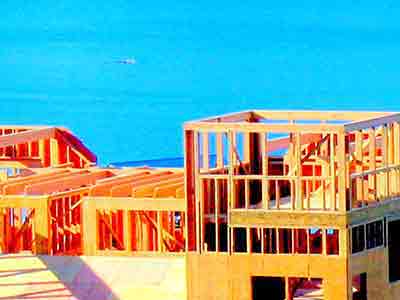Construction Mortgages.
Construction loans
come in a variety of options to suit various needs a borrower may have. Among the most common are structured so that while construction is taking place, the borrower makes interest only payments, after which the loan would convert to a traditional mortgage. These loans pay out in accordance with the completion of the project so that the more construction is completed; the more the loan gets funded. Other loans in this category allow for payments to be paid directly to contractors and suppliers as needed, or for reimbursements to occur as the builder incurs costs
to suit various needs a borrower may have. Among the most common are structured so that while construction is taking place, the borrower makes interest only payments, after which the loan would convert to a traditional mortgage. These loans pay out in accordance with the completion of the project so that the more construction is completed; the more the loan gets funded. Other loans in this category allow for payments to be paid directly to contractors and suppliers as needed, or for reimbursements to occur as the builder incurs costs during construction.
APPLY
Rules for Construction Loans.
construction loan
is time. Before approaching the finance aspect of a given project, it is important to have your due diligence completed. This includes but isn’t always limited to things like:
Before approaching the finance aspect of a given project, it is important to have your due diligence completed. This includes but isn’t always limited to things like:• Knowing who your builder will be, and insuring your builder is fully qualified to handle the type of project you are looking to complete. A qualified builder is often required to have a track record of building safe and lasting homes. If you are looking to build the project on your own, this would often constitute a completely different type of loan. If you’d like to know more about how these loans differ, please don’t hesitate to reach out to us for more information.
• Financial statements such as profit and loss reports, income statements, and a credit check to ensure the borrower is just as qualified as the project are often required.
• Your “Blue Book”: fully detailed plans of the finished project you are planning to achieve (i.e. floor plans, layouts, details such as dimensions of rooms and even down to the types of insulation planning to be used, etc), as well as an outline of the construction process with as much detail in each step as possible, must be assembled in what is commonly referred to as a “blue book”.
• Future estimated profit potential of the property may be required so be ready to know the estimated value of a property after construction or renovations and additions are completed. This involves knowing the complete labour and materials costs in relation to said figure.
• An Appraisal: Though it might seem like an odd thing to do on a property that may not yet exist, lenders often require an appraisal to be completed. This involves a licensed appraiser considering your blue book details of the home, assigned land value for the property, and comparing the total package to other comparable properties in the surrounding area.
• Down payment: Lenders typically require a somewhat sizeable downpayment, especially if the project is a particularly ambitious one. Typically, lenders seek a minimum down payment of around 20%, though depending on the lender and the scale of the property, that number can increase significantly. Builds often incorporate several variables, thus the down payment is set to ensure a few things. First, the lender wants to account for the possibility that the finished product does not achieve the initial appraised amount. Also, the lender is looking to ensure that you the builder are serious and committed to this project, and won’t abandon it if difficulties or delays emerge along the way.We know these kinds of loans may seem like a lot, and that’s why we’re here to help you every step of the way. Contact us today to see if a

